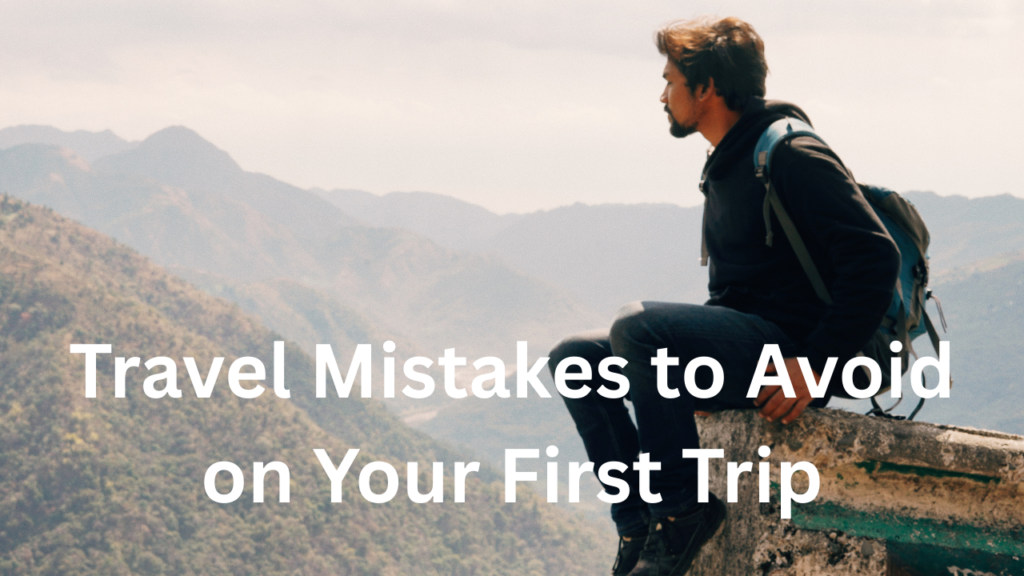Traveling for the first time abroad (or even domestically) is exciting, but it can also feel overwhelming. From booking flights to navigating unfamiliar cultures, beginners often make common mistakes that can cost time, money, and peace of mind.
I vividly remember my first international trip to Europe. I was so eager that I booked everything last-minute, carried too much luggage, and underestimated how much small mistakes could affect the overall experience. Looking back, those lessons were invaluable—they taught me how to travel smarter.
In this guide, I’ll walk you through the most common travel mistakes first-timers make, why they matter, and how to avoid them. These tips are based on personal experience, expert advice, and research-backed insights so you can enjoy a smoother, stress-free journey.
1. Overpacking Your Luggage
The mistake: Bringing too many clothes, gadgets, and “just-in-case” items.
- Heavy bags cost more (checked baggage fees can reach €30–€60 per flight).
- Lugging them around slows you down and increases stress.
How to avoid it:
- Follow the “3–4 outfit rule”: bring versatile clothing that you can mix and match.
- Use packing cubes to stay organized.
- Remember, most destinations have laundry services or laundromats.
Personal experience: On my first trip to Dublin, I carried two large suitcases. I ended up wearing only half the clothes and spent unnecessary money on baggage fees. Since then, I’ve switched to carry-on only—it’s cheaper and far more convenient.
2. Booking Everything Last-Minute
The mistake: Thinking you’ll find cheaper deals closer to your travel date.
- Research by CheapAir shows international flights are cheapest 2–6 months before departure.
- Last-minute bookings often lead to higher costs and fewer options for accommodation.
How to avoid it:
- Use fare alerts from Google Flights or Skyscanner.
- Book accommodation early, especially during peak seasons.
4. Not Researching Local Customs and Laws
The mistake: Assuming what’s normal at home applies everywhere.
- In Japan, tipping is considered rude.
- In Singapore, chewing gum in public is banned and fined.
- Some religious or cultural sites require modest clothing.
How to avoid it:
- Read about cultural etiquette before you go.
- Use guidebooks, blogs, or official tourism websites.
Example: I once nearly entered a temple in Thailand without realizing I needed to cover my shoulders. Thankfully, a kind local warned me before I embarrassed myself.
5. Overscheduling Every Day
The mistake: Trying to fit every attraction into one trip.
- Leads to exhaustion, stress, and “checklist travel.”
- You miss out on spontaneous experiences.
How to avoid it:
- Plan 2–3 main activities per day, leaving time for relaxation.
- Embrace slow travel—sometimes the best memories come from unplanned moments, like wandering local markets or chatting with locals.
6. Not Budgeting Properly
The mistake: Underestimating daily expenses.
- Meals, transport, entry tickets, and small purchases add up quickly.
- Many first-timers run out of cash halfway through the trip.
How to avoid it:
- Research average daily costs for your destination.
- Use budgeting apps like Trail Wallet or Mint.
- Set aside an emergency fund of at least 10–15% of your total budget.
7. Poor Money Management Abroad
The mistake: Using airport exchange kiosks or credit cards with high fees.
- Exchange rates at airports can be 10–15% worse than banks.
- Foreign transaction fees typically add 2–3% per purchase.
How to avoid it:
- Get a travel-friendly debit/credit card with no foreign transaction fees (e.g., Wise, Revolut, Chase Sapphire).
- Withdraw cash from bank ATMs instead of kiosks.
8. Relying Too Much on Technology
The mistake: Assuming your phone will work everywhere.
- Roaming charges can be astronomical.
- Getting lost without Wi-Fi or mobile data can be stressful.
How to avoid it:
- Buy a local SIM card or use eSIMs (Airalo, Holafly).
- Download offline maps (Google Maps or Maps.me).
- Carry printed copies of reservations just in case.
9. Forgetting Important Documents
The mistake: Misplacing passports, visas, or travel confirmations.
How to avoid it:
- Keep digital and paper copies of key documents.
- Store originals in a money belt or hotel safe.
- Use cloud storage (Google Drive, Dropbox) for backups.
10. Skipping Rest on Arrival
The mistake: Planning a full sightseeing day immediately after landing.
- Jet lag and exhaustion reduce enjoyment.
- You risk burnout at the start of the trip.
How to avoid it:
- Schedule light activities on the first day (like a walk or casual meal).
- Stay hydrated and adjust to the new time zone gradually.
Common First-Time Travel Mistakes at a Glance
| Mistake | Why It’s a Problem | How to Avoid It |
|---|---|---|
| Overpacking | Extra baggage fees, heavy load | Pack light & versatile |
| Last-minute booking | Higher costs, fewer options | Book 2–6 months ahead |
| Ignoring local customs | Risk of offense or fines | Research etiquette beforehand |
| Overscheduling | Exhaustion & stress | Plan 2–3 main activities/day |
| Poor budgeting | Running out of money | Use apps & emergency fund |
| Bad money exchange | Higher fees & poor rates | Use travel-friendly cards |
| Tech overreliance | Roaming costs & outages | Get SIM/eSIM & offline maps |
| Document mismanagement | Travel disruptions | Keep digital & paper copies |
| Skipping rest | Burnout | Light schedule on arrival |
FAQs
Q: How much should I budget for my first international trip?
A: It depends on the destination. A budget traveler in Europe might spend €40–€70/day, while in Southeast Asia it could be €20–€40/day.
Q: Is it safe to travel alone on your first trip?
A: Yes, but take precautions—choose safe destinations, stay connected with family, and avoid risky situations.
Q: Should I join a group tour for my first trip?
A: Group tours can provide structure and security, but independent travel offers flexibility. A mix of both works well for beginners.
Conclusion
Your first trip should be exciting, not stressful. By avoiding these common mistakes—overpacking, poor budgeting, ignoring insurance, and overscheduling—you’ll create space for meaningful, memorable experiences.
Travel isn’t just about ticking off attractions; it’s about learning, adapting, and embracing new perspectives. With preparation and awareness, your first trip can be the beginning of a lifelong passion for exploring the world.
What about you? If you’re planning your first trip or recently returned from one, what mistakes did you make—or avoid? Share your experience below, and let’s help new travelers feel more confident before they set off.

Hi, I’m Tanvir, the founder and author of Explore Ireland Now. With a deep love for Ireland and its rich culture, history, and landscapes, I created this site to share everything that makes this beautiful country worth exploring. Whether you’re a local looking for hidden gems or a traveler planning your next adventure, I provide insightful guides, tips, and recommendations to help you experience Ireland to the fullest.
From stunning landscapes to vibrant cities and quaint villages, Ireland is full of wonders waiting to be discovered. Through my personal experiences and research, I aim to bring you the most up-to-date information and inspiration for your journey.
Thank you for visiting Explore Ireland Now—I hope my content helps you uncover all that this incredible country has to offer! If you have any questions or need travel advice, feel free to reach out.



